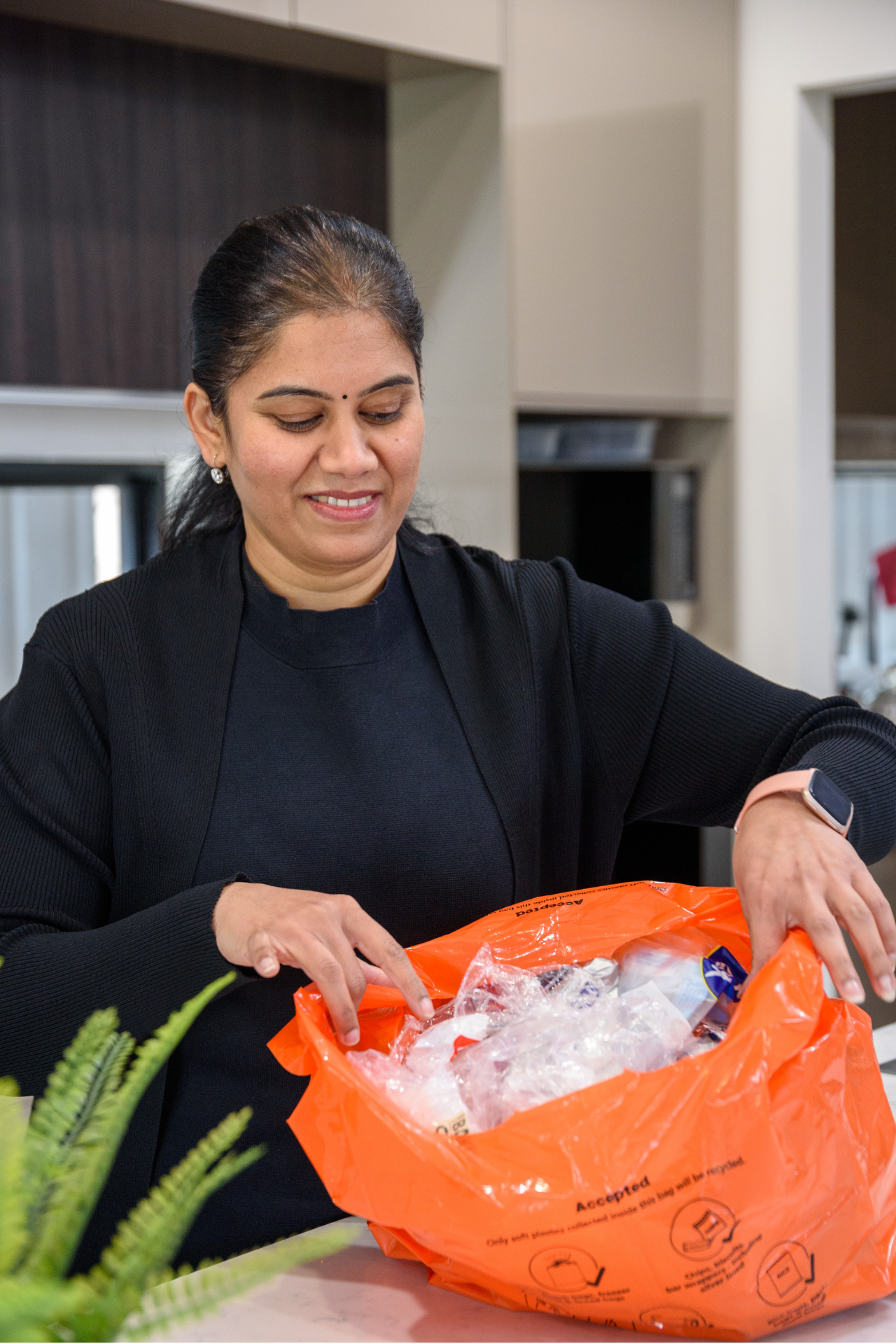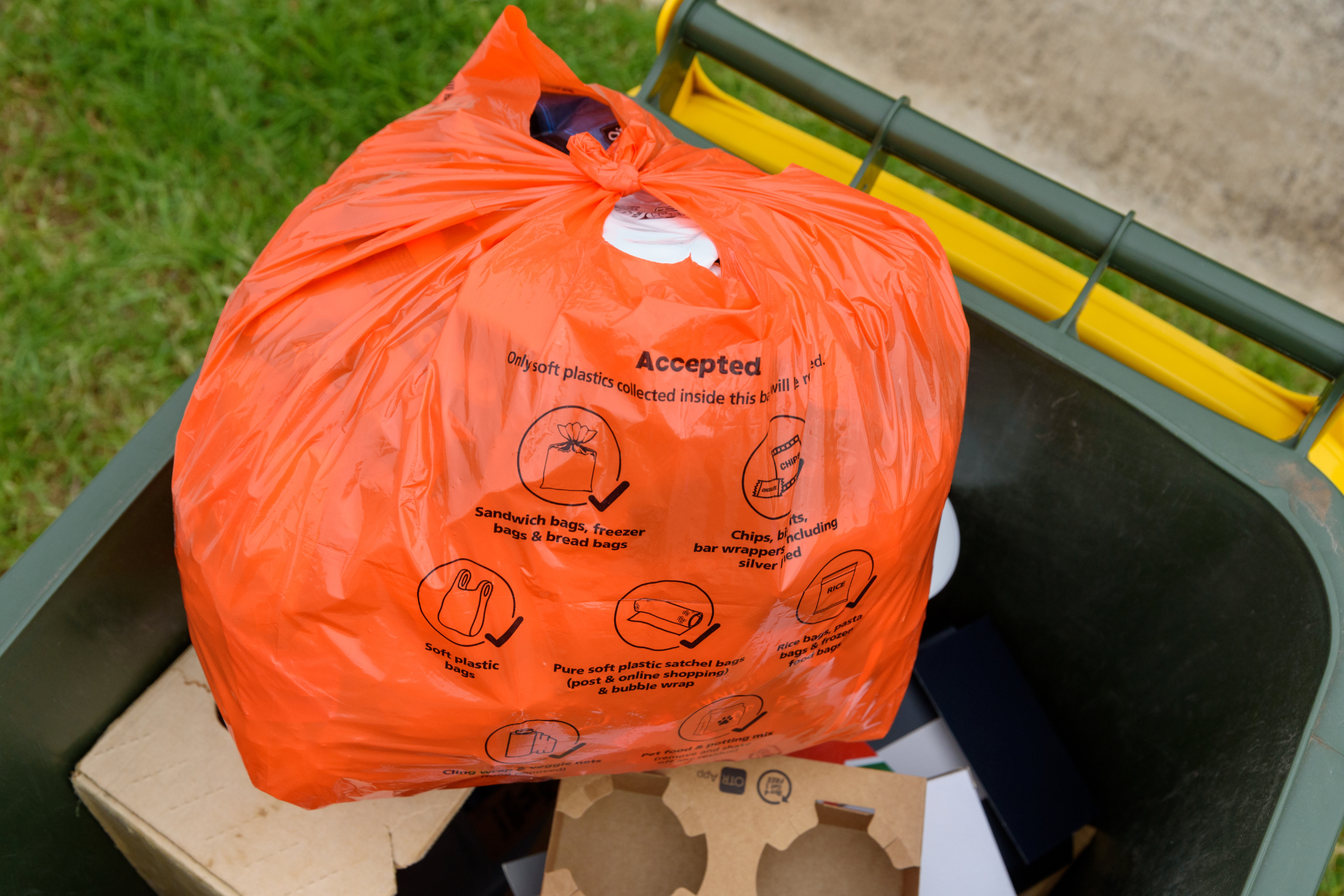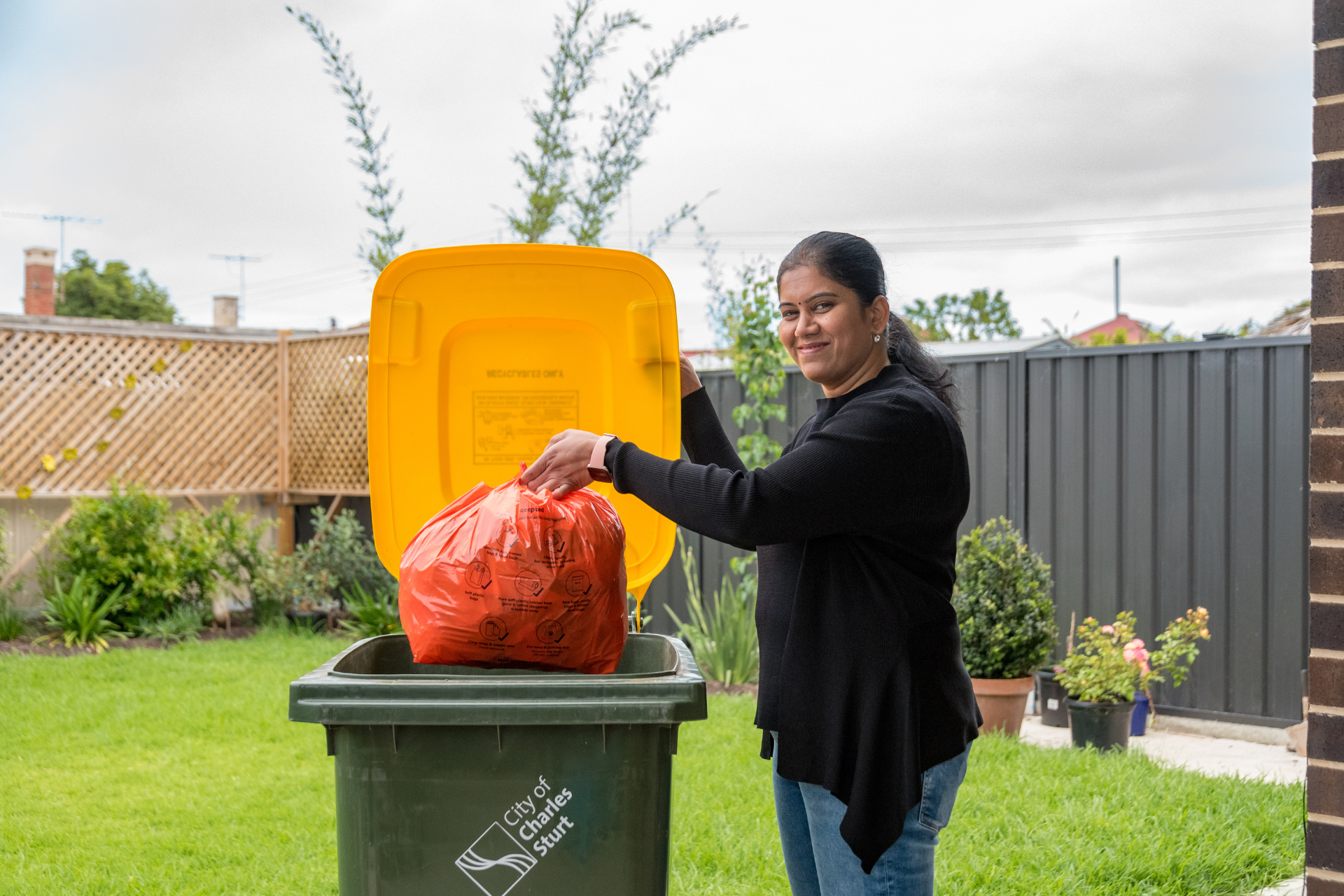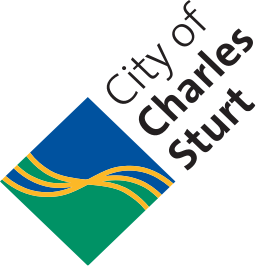Trial Areas
If you are in Beverley or Woodville South and Thursday is your collection day, you are part of the trial area. In December 2022, you should have received a kit to help you be part of the 12 month trial of soft plastics collections in your yellow lid recycling bin.
How to use the bags provided
Step 1: Fill the coloured bag provided with your soft plastic packaging.

Step 2: When it’s very full like a pillow, tie it securely. If it's not yet full, please keep collecting your soft plastics in this bag until it's full.

Step 3: Put your full coloured bag in your yellow lid recycling bin for us to collect in your normal recycling service.

- Please only use the coloured bags provided during the trial period
- Never put loose soft plastics in your recycling bin as these can get stuck in the machines at the material recovery facility and will not be recycled.
- Ensure packaging is dry and empty of any food or liquid.
- Only use the orange bags supplied during the trial period.
- Keep all other recyclable items loose in your yellow lid recycling bin, as you normally would.
What can go in the bags
Common soft plastic packaging includes bags for chips, cereal and sweets, soft packaging from fresh and frozen foods, bubble wrap and cling wrap.
Please make sure your plastic is dry and as empty as possible before placing in your coloured bag.
- Biscuit packets (outer wrapper only)
- Bread bags (without the tie)
- Bubble wrap (large sheets cut into A3 size pieces)
- Cat and dog food pouches (as clean and dry as possible)
- Cellophane from bunches of flowers (cut into A3 size pieces)
- Cereal box liners
- Chip and cracker packets (silver lined)
- Chocolate and snack bar wrappers
- Cling film - GLAD, COLES HOME brand and WOOLWORTHS Essentials Home brand ONLY
- Confectionery bags
- Document sleeves (remove the white reinforcement strip along the holes)
- Dry pet food bags
- Fresh produce bags
- Frozen food bags
- Green bags (woven polypropylene bags)
- Ice cream wrappers
- Large sheets of plastic that furniture comes wrapped in (cut into A3 size pieces)
- Meat - plastic packaging that has contained meat (rinse and dry first)
- Netting produce bags (any metal clips removed)
- Newspaper and magazine wrap
- Pasta bags
- Pet food bags (chaff/horse/chicken) - both the plastic and woven polypropylene types (but not woven nylon). Cut into A3 size pieces and shake free of as much product as possible
- Plastic Australia Post satchels
- Plastic carrier bags from all stores
- Plastic film wrap from grocery items such as nappies and toilet paper
- Plastic sachets
- Potting mix and compost bags - both the plastic and woven polypropylene types (cut into A3 size pieces and free of as much product as possible)
- Rice bags - both plastic and the woven type (if large, cut into A3 size pieces)
- Snap lock bags / zip lock bags
- Squeeze pouches with lid on (e.g. yogurt/baby food)
- Wine/water bladders - clear plastic ones only
Please do not put the following materials in your coloured bag:
- ‘Hard or rigid’ plastic containers/packaging. Please place these items loosely in your yellow lid recycled bin for recycling.
- Lids, bread tags or balloons. These items go in your blue or red lid landfill bin.
- Compostable plastics. Your green organics bin is the best place for these to ensure they can be recycled.
- Degradable plastics. Please place these in your blue or red lid landfill bin.
- Dirty soft plastics. Soft plastics that are dirty need to go in the landfill bin as they cannot be recycled if not clean.
Frequently Asked Questions
Taking part in this trial is not compulsory but we’d love you to participate. By participating in the trial, you are helping us help build and design a model for successful bagged soft plastics recycling in Australia. You might also be surprised at how much more space you have in your regular rubbish bin come collection night.
Yes, it’s free. Thanks to the support of the Australian Food and Grocery Council, the Australian Government, the food and grocery manufacturing industry, Green Industries SA and the City of Charles Sturt, this trial service is provided at no cost to participating households.
Soft plastic packaging includes the "scrunchable” plastic bags and wrappers that food, grocery and other products come in. The most common items are bread bags, breakfast cereal bags, frozen vegetable bags, ice cream wrappers, confectionery bags, cling wrap, bubble wrap and plastic wrapping from toilet paper.
We have been very careful to ensure we have recycling options available for the soft plastics generated through this trial, and ensuring the material is directed to the best possible recycling outcome.
Our trial areas are very small, which means that businesses that couldn’t deal with larger quantities of soft plastics (for example from Coles and Woolworths) can still comfortably deal with our very modest amounts.
At this stage we have secured two recycling options to take our soft plastics:
- Working with the Australian Food and Grocery Council, who have partnered with APR in Victoria. APR makes soft plastic material into an oil product, which is suitable for use in an oil refinery to be made back into food-grade plastics. We see this as a fantastic end to end recycling option for soft plastic material, as it is basically taking plastic packaging and making it back into soft plastic packaging. It is only a very small operation at the moment, working at R&D scale essentially. But they’re big enough for our tiny volume, which is great, and looking to expand.
- We’re also working with IQ Renew in NSW, a company that currently processes the material from a number of NSW Councils offering the Curby program (for example from the Central Coast Council and the City of Newcastle). They also have ample capacity to process our material, and have a range of other businesses they then send the material to once they’ve sorted it into different polymer types.
Over the course of the following 12 months, we believe that other options may also open up. We will review these as they come and determine where is best to send the material at each point in time.
We need soft plastics to be collected in a dedicated bag because loose soft plastics can jam up recycling machinery in trucks and at recycling facilities. The orange trial bags have been provided specifically to be the right strength, easy to identify and easy to sort when filled and sealed correctly. It’s very important to keep all other recyclable items in your yellow-lidded recycling bin loose, as you normally would.
Enclosed with this pack you received is 20 bags. If you run out of them before the end of the 12-month trial period, please contact council on 8408 1111 to organise additional bags so that you can continue to be part of the trial.
Soft plastic packaging does an important job keeping food fresh, safe and intact. By taking part in this trial, this material can be recycled instead of going to landfill.
The bagged soft plastics kerbside recycling trial is the start of a bigger plan, to design an industry-led scheme for recycling soft plastic packaging in Australia. The scheme aims to create an advanced recycling industry producing recycled, food-grade soft plastic packaging, which currently isn’t made in Australia. The trial is one of a number being conducted by the Australian Food and Grocery Council to help design the model for kerbside collection and sorting of used soft plastics.
This trial is not connected to the REDcycle store drop-off scheme and is not affected by the announcement that REDcycle has temporarily paused its scheme from 9 November 2022. The council trial will continue uninterrupted.
